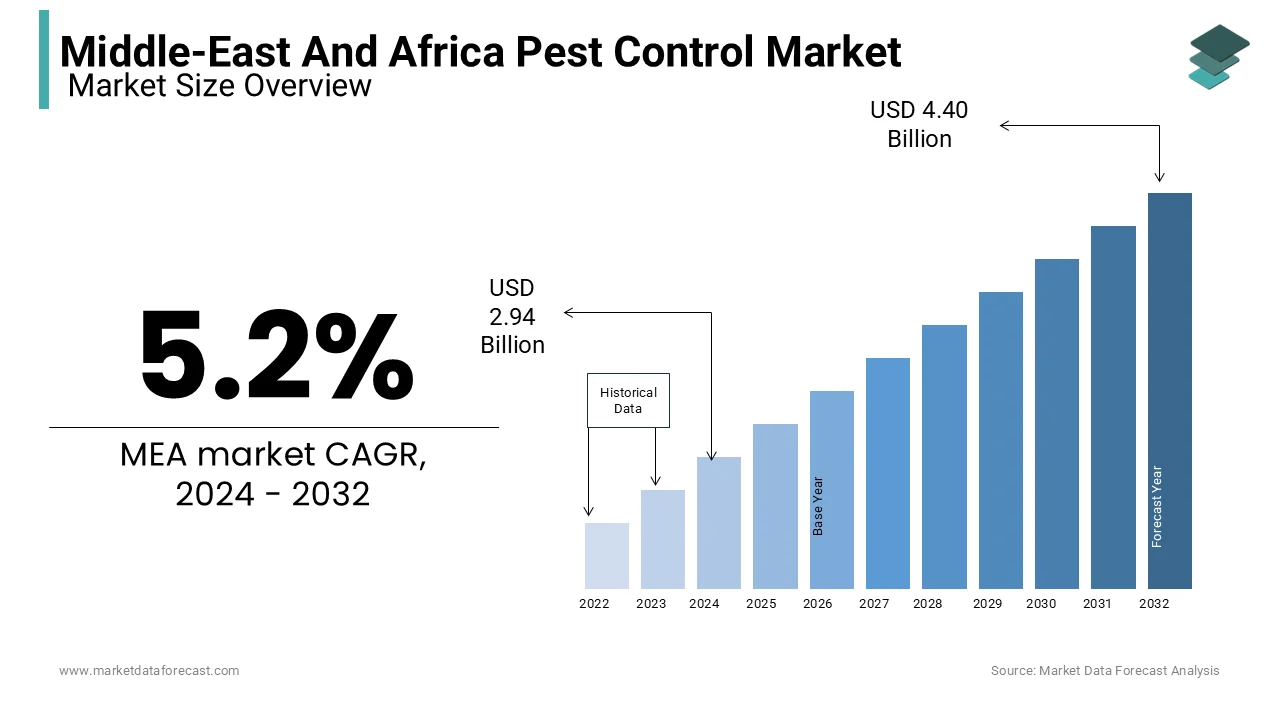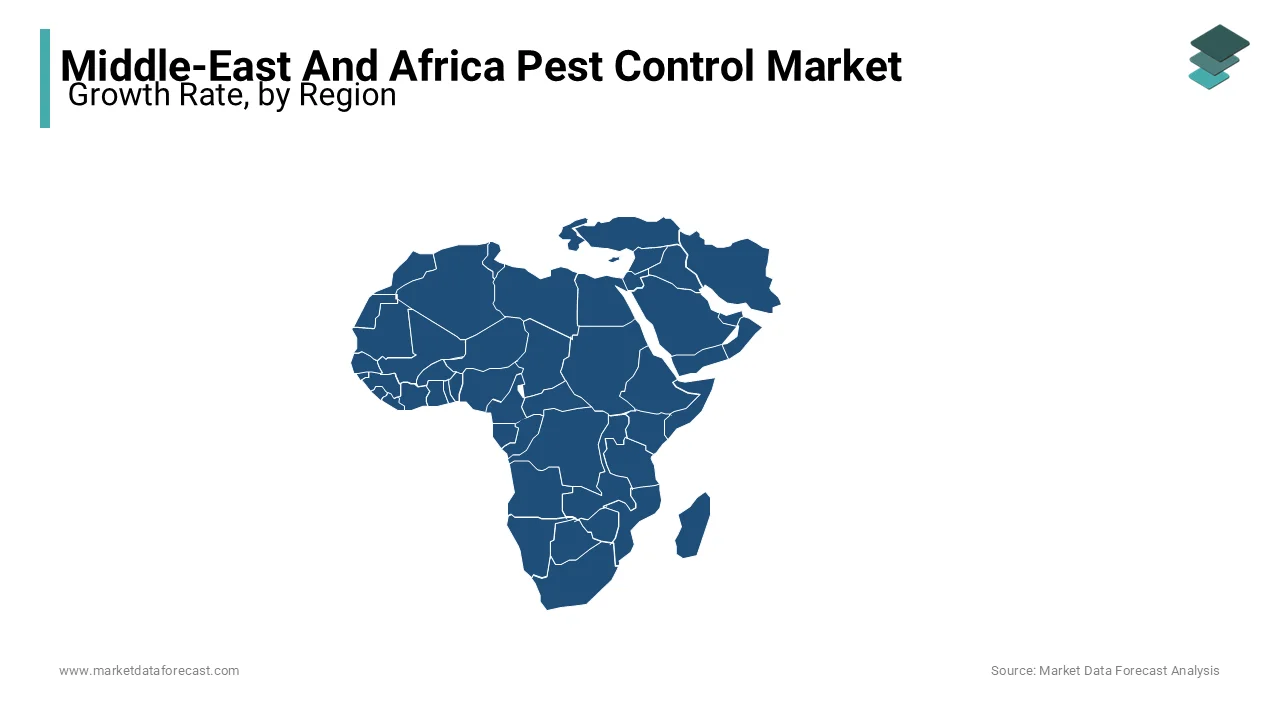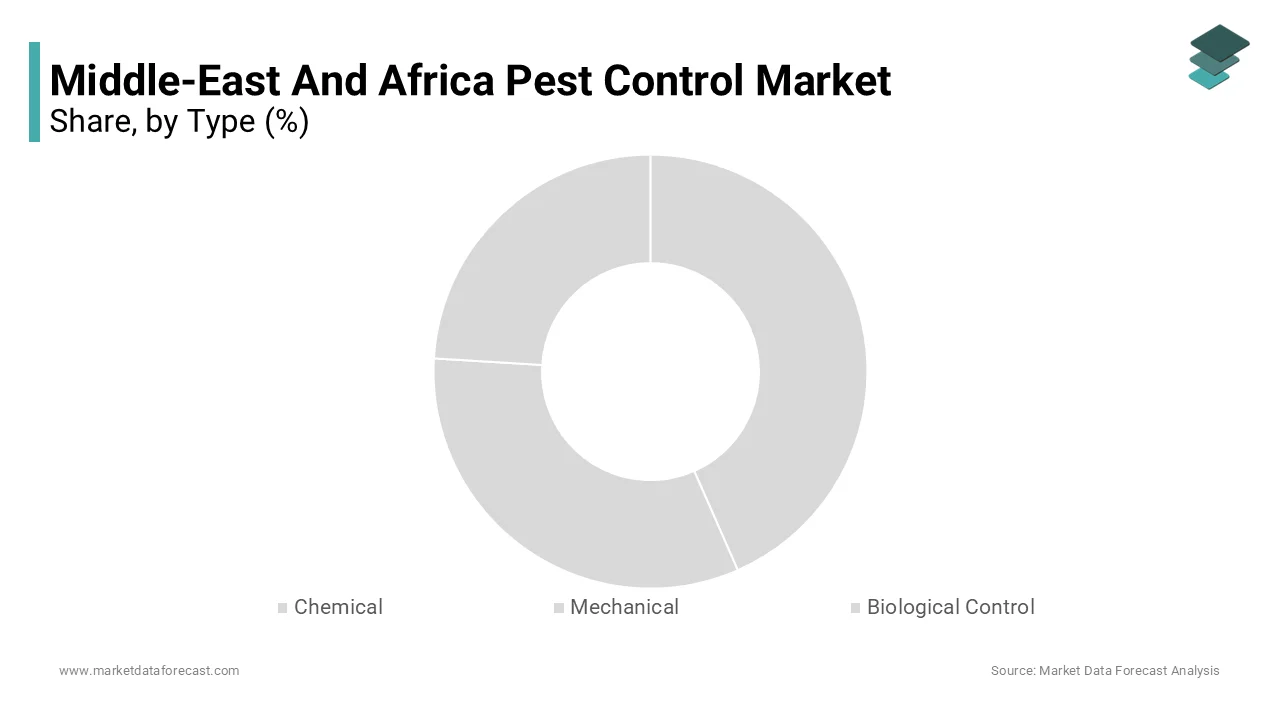Middle-East And Africa Pest Control Market Research Report – Segmented By Type, Application, Pest Type, And By Country (KSA, UAE, Israel, South Africa, And Ethiopia, Kenya, Egypt, Sudan, Rest of GCC Countries, and Rest of MEA) - Industry Analysis, Size, Share, Growth, Trends, And Forecast (2024 to 2032)
Middle-East and Africa Pest Control Market Size (2024 to 2032)
The Middle East and Africa pest control market was expected to be valued at USD 2.79 billion in 2023 and is anticipated to reach USD 2.94 billion in 2024 from USD 4.40 billion by 2032, estimated to be growing at a CAGR of 5.2% from 2024 to 2032.

The basic definition of pest control is that it is the regulation and management of different biological organisms that are harmful for the human population either directly or by adversely affecting human activities. Common pests such as termites, cockroaches, and certain reptiles affect humans daily by interfering in agricultural, industrial, and residential activities. For ensuring a hygienic lifestyle where the interference of pests is minimal, pest control management is carried out. Additionally, pest control is an important market in developing regions trying to maximize efficiency in their production activities.
The main aim of pest control is minimizing the effect of organisms that adversely affect human production activities without changing the balance of the ecosystem too much. Pest control is relevant in the agricultural as well as the industrial sectors with stakes also being in domestic situations. Developments in the pest control industry include bio-degradable pesticides whose ecological footprint is comparatively less.
The main drivers of the Middle East & Africa pest control market are the prevalence of high global temperatures and a rise in economic activity. The middle-east region is one of the most economically active regions in the world, whereas Africa has the highest mean temperatures across the year. The elevated temperature leads to pests, especially insects thriving in abundance in the region. This creates a high demand for efficient and cost-effective pest control in the region. The region is still underdeveloped compared to the global markets, with Middle-East being the exception. This is the constraint for the region, along with inflated costs faced by customers and challenges faced by the companies due to a lack of technological advancements.
Market Overview
The agricultural crops in Middle Eastern and African countries face different challenges due to pests and other diseases. The rising concern over food insecurity challenges is also one of the major aspects to concentrate on pest control so as to increase the quality and quantity. More than 45% of the crop is lost due to pests in the UAE, which is raising concerns about swiftly adopting new technologies and methods to overcome these challenges. The use of pest control can reduce the damage by up to 50% and enhance the productivity. The launch of various technological advancements in agriculture is all set to pose huge growth opportunities for the market in the coming years.
Market Drivers
The market is majorly driven by the rising awareness of the use of effective control strategies to increase crop yield in countries like the UAE, Saudi Arabia, and others. Government authorities are greatly supporting through investments in agriculture in the Middle East and African region. Urban farming systems are quickly spreading, and all are subject to enhancing the usage of pest control in a meaningful way. Urban farming systems demand various pest control management systems that may be traditional methods as well to enhance productivity. Ongoing concern over food insecurities in many countries due to unusual climatic conditions due to global warming and the rising number of diseases due to insects and others is attributed to quickly adopting the necessary changes in cultivation, especially in urban cities. There is a demand to produce crops locally rather than import them from other countries due to the rising difficulty in trading. The rising urban population in the Middle East and African countries is also one of the most common factors that will cause the market to grow eventually. According to recent studies, 82.3% of the people in the UAE live in urban areas, and the number is likely to increase in the coming years at a random rate. Therefore, the need to adopt new farming techniques in urban populations with the increasing demand for high-quality crop yields is subsequently to leverage the growth rate of the market.
The prominence for public safety and hygiene is gearing up to level up the growth rate of the Middle East and Africa pest control market. In recent times, the demand for organic pest control methods has been adopted so quickly that they do not harm the environment or consumers. Key companies are making new changes in developing pest control methods that are intercepted by the government's rules and regulations, which is likely to increase the growth rate of the Middle East and Africa's pest control market. The trend towards healthier eating habits, especially among the people living in the urban population, is showcasing huge opportunities for proper agriculture crop management through higher production. This is accounted for by leveraging the growth rate of the market.
Market Restraints
Lack of high knowledge of the use of advanced technologies like urban farming is majorly hindering the growth rate of the market. Many farming people do not have the knowledge of modern techniques and still follow the traditional ways, which may majorly have a negative impact on the environment. Unfavorable climatic conditions due to deforestation and traditional practices are likely to decline the growth rate of the pest control market.
Launch of various products that are locally made without following the rules and regulations of the government is witnessed to limit the growth rate of the market. Many local products are not as effective as those approved by the government authorities. These locally made pest control products do not effectively produce high-quality crops and also pose harmful effects on the farmers due to high toxin levels.
Market Opportunities
The various types of vector-borne diseases are becoming sophisticated and amplifying the growth opportunities of the Middle East and Africa pest control market. These diseases are quite common in this region, which is increasing the need for effective and prominent pest control products that efficiently avoid the risk and boost crop yield. The demand for higher crop production by overcoming these challenges in this region is accounted to bolster the growth rate of the market to the extent.
According to the World Health Organization, 17% of all infectious diseases are vector-borne diseases, which are very common in the Middle East and African countries. The study also predicts that in the coming period, pest control methods will be a huge necessity to increase the efficiency of the crop yield.
The adoption of pest control measures, even in households, due to the rise of these diseases, is solely to showcase huge growth opportunities for the Middle East and African pest control market.
Market Challenges
The rising concern over the negative effects of using pest control, such as asthma and other illnesses, eventually leads to a rise in serious concern over the use of pest control. Lack of complete knowledge of the use of locally made products is highly dangerous due to its negative impact, which is one of the major challenging factors for the market. The use of pest control for agriculture is solely dependent on specific methods, whereas reluctance to adopt these changes is impeding the growth rate of the market. Also, the studies reveal that the higher use of pesticides or insecticides can contaminate soil fertility and reduce crop yield, which will also slow down the use of pest control in the coming years. However, government support through investment and the growing popularity of new techniques in farming shall promote the growth rate of the market in the coming years.
REPORT COVERAGE
|
REPORT METRIC |
DETAILS |
|
Market Size Available |
2023 to 2032 |
|
Base Year |
2023 |
|
Forecast Period |
2024 to 2032 |
|
CAGR |
5.2% |
|
Segments Covered |
By Type, Application, Type of Pest and Region |
|
Various Analyses Covered |
Global, Regional & Country Level Analysis, Segment-Level Analysis, DROC, PESTLE Analysis, Porter’s Five Forces Analysis, Competitive Landscape, Analyst Overview on Investment Opportunities |
|
Regions Covered |
Algeria, Bahrain, Egypt, Kuwait, Qatar, Saudi Arabia, UAE |
|
Market Leaders Profiled |
Ecolab, Rollins, Rentokil Initial, Service Master Global Holdings, Massey Services, Arrow Exterminations, Sanix Incorporated, Asante, and Dodson Brothers Exterminating Company. |
This research report on the Middle East and Africa pest control market is segmented and sub-segmented into the following categories.
Middle-East and Africa Pest Control Market Analysis By Type
- Chemical
- Mechanical
- Biological Control
The chemical segment is leading with a prominent share of the market. This type of pest control is used to manage or control pests in agriculture, households, and industries. The prevalence of lowering or eliminating the insects or any other micro-organisms that cause harm to the crop is propelling the use of chemical pest control. The crop yield is completely dependent on the use of precise pest control products that reduce the infection of the plants caused by insects or any other pest. Therefore, growing awareness among farmers of the use of high-quality products and various technologies in agriculture is esteemed to leverage the growth rate of the market.
The biological control segment is likely to hit the highest CAGR by the end of the forecast period. This is the best environmentally friendly procedure that does not impose any harmful effects on the growth rate of the market. The method involves releasing natural enemies for pests like predators and parasitoids, which is an environment-friendly matter that is gaining huge attention from the government authority's eye.
Middle-East and Africa Pest Control Market Analysis By Application
- Commercial
- Industrial
- Agricultural and Residential Control
The agricultural and residential control segment holds a dominant share of the market. The significant use of pest control is highly notable for increasing the production rate of the crop to meet the ongoing demand for the huge food supply in many countries, especially in this region. The food insecurity bells are ringing in economic countries, which is an alarming sign to adopt all the possible methods to enhance food productivity to fulfill this demand. Growing infectious diseases like dengue, malaria, and others due to parasites also fuel the growth rate of the market.
The commercial pest control segment is gaining huge traction over the growth rate of the market. The countries in the Middle East and Africa are developing at a rapid rate, and the number of restaurants and other commercial sectors is increasing, requiring pest control methods.
Middle-East and Africa Pest Control Market Analysis By Type of Pest
- Termites
- Insects
- Rodents
- Wildlife
The insects segment is deemed to have the prominent growth rate in the market, whereas the termites segment is likely to hold the highest CAGR by the end of the forecast period. Most residential areas experience a huge number of pests that vary according to temperature. The rising prominence of taking necessary measures at any cost to avoid major health risks among humans is gearing up the growth rate of the market. This is not only in residential areas but also in agricultural fields, where the management necessity of pests is increasing and is solely responsible for the expansion of the market growth in the coming period.
The termination is a serious concern in the Middle East and African regions as they directly pose a threat to buildings where they damage wooden and other infrastructural buildings. It is highly important to prevent or take necessary action to protect the buildings through pest control methods appropriately.
COUNTRY ANALYSIS
Based on geography, the Middle East and Africa market is classified into
- Algeria
- Bahrain
- Egypt
- Kuwait
- Qatar
- Arabia
- UAE
- Others

South Africa is ruling with the dominant share of the market due to increasing per capita income. The increasing number of commercial and residential areas in this country is attributed to the use of various technologies to reduce the risk of different pests, especially in urban areas. The improved infrastructure in urban areas is gearing up the need for effective pest management. There are wildlife pests in this country, which is also one of the factors that caused the market to grow in South Africa. The rising demand from people to eat high-nutritional foods to stay fit and healthy amidst the rising concern for food security is solely elevating the adoption of new techniques in farming that is further attributed to leveling up the growth rate of the market.
UAE is expected to showcase the highest CAGR by the end of the forecast period. High disposable income and rising urbanization are two major attributes driving the growth rate of the market in this country. The government imposed that it is mandatory to follow pest control methods in the UAE to create a pest-free environment. These government initiative steps will greatly influence the growth rate of the market.
KEY PLAYERS IN THE MIDDLE EAST AND AFRICA PEST CONTROL MARKET
Some of the major players dominating the market in the region, by their products and services include Ecolab, Rollins, Rentokil Initial, Service Master Global Holdings, Massey Services, Arrow Exterminations, Sanix Incorporated, Asante, and Dodson Brothers Exterminating Company.
Related Reports
Access the study in MULTIPLE FORMATS
Purchase options starting from $ 1600
Didn’t find what you’re looking for?
TALK TO OUR ANALYST TEAM
Need something within your budget?
NO WORRIES! WE GOT YOU COVERED!
Call us on: +1 888 702 9696 (U.S Toll Free)
Write to us: [email protected]
